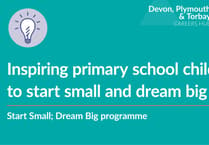Almost 19 per cent of youngsters in care in Devon up to the age of 18 are not in education, employment or training, compared to just five per cent of all young children aged 16 to 19, according to Devon Country Council (DCC).
The figure rises to 40 per cent for children and young people in care, and care leavers aged between 16 and 25 years old.
According to DCC, the latest data “suggests that children in care are more likely than children who are not in care to not be in education, employment or training (EET)”.
Devon’s figures are in line with the rest of the country, demonstrating people in care or who have previously been in care face additional issues when it comes to securing EET, DCC said.
Wendy Ohlson, Headteacher for the Virtual School, which links all Devon’s schools with additional support for children in care, said the data also showed that children in care not currently in EET tended to be those who have come into care late (over the age of 16).
“Until then they’ve lived with their parents, and perhaps not had the level of support they’ve needed to engage well with education and future planning. And perhaps they’ve not thought much about opportunities for them and the lives they might like to have as adults,” she said.
“Children in care who have moved a lot within the care system, from carer to carer, place to place, and who perhaps have had their education interrupted on occasions, are another group who we see sometimes not in education, employment or training. Both groups often have low self-esteem, and are more likely to have found their education difficult.”
Opportunities are missed because children in care often do not grow up in a supportive environment where they are encouraged to achieve their goals.
To address the issue, Ms Ohlson said the Virtual School has been working with a number of colleges to boost the chances of children in care once they leave school.
One such college is Exeter College, which launched its first ‘aspiration day’ last year for children in care aged between 11 and 13. The children were invited to spend the day reviewing key subject areas and meeting students while being made aware of the opportunities open to them after they left school.
Ms Ohlson explained that they were also working with he University of Exeter on similar ‘aspiration days’ to encourage more children in care to attend university, in addition to developing a mentoring scheme.
In that respect, the Virtual School was working with the charity Young Devon to roll out a programme of mentoring support for children most at risk of disengaging with their education.
Duncan Cherrett, from Young Devon, said: “Sometimes there’s a switch we need to help young people find within themselves, which is a bit like turning on the light. Helping young people to understand where their lives have been, and where they are now, and where they can be in future, is an important part in a person’s development.”
Councillor Andrew Leadbetter, DCC’s cabinet member responsible for Children’s Services, said he was confident investing in such schemes would result in fewer children in care drifting out of EET, and more young people succeeding well at school, college, university, employment and in life.
“Like any parent, we’re concerned about the futures for children in our care. We want them to have the same opportunities as other children, and we want to help them make good choices and support them with their aspirations.”




